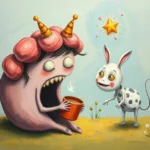
Dreams are fascinating windows into our subconscious, often revealing our deepest fears, desires, and emotions. Among the myriad symbols that may appear in our dreams, the capybara—a large, semi-aquatic rodent native to South America—might seem an unlikely subject. Yet, for those who dream of this gentle creature, the capybara can carry profound symbolic significance. Understanding the symbolism behind such dreams can provide valuable insights into our waking lives and emotional states. This article delves into the meaning of dreaming about capybaras, the various scenarios in which they may appear, and how these dreams can connect to real-life situations.
Symbolism and Meaning
When analyzing the symbolism of the capybara in dreams, it’s essential to consider the characteristics of the animal itself. Capybaras are known for their sociable nature, often living in groups and exhibiting calm, peaceful behavior. As such, dreaming of a capybara may symbolize a desire for community, companionship, or a search for peace in one’s life. The capybara’s connection to water also signifies emotions—dreaming of this creature might represent a need to navigate one’s feelings or to explore the depths of one’s emotional state.
Moreover, the capybara’s adaptability to various environments suggests a flexibility or resilience in the dreamer. If you find yourself dreaming of capybaras, it could indicate that you are currently in a situation that requires you to be adaptable or to embrace change. This symbolism encourages you to reflect on how you can adjust to new circumstances or relationships in your life.
From a psychological perspective, the dream may also tap into themes of nurturing and support. Since capybaras are social animals, their appearance in a dream may point toward a longing for connection or community support. This is particularly relevant for individuals feeling isolated or overwhelmed in their waking lives. The capybara can serve as a gentle reminder of the importance of nurturing relationships and fostering a sense of belonging.
Key Scenarios and Variations
The meaning of a capybara in dreams can vary significantly based on the context in which it appears. For instance, dreaming of a capybara swimming peacefully in water might suggest a sense of emotional well-being and stability. In this scenario, the dreamer may feel comfortable navigating their emotional landscape, indicating a time of tranquility and acceptance.
Conversely, if the capybara appears in a chaotic or threatening situation, such as being chased or trapped, the interpretation shifts dramatically. This scenario may represent feelings of anxiety or stress, suggesting that the dreamer feels overwhelmed by their circumstances or relationships. The capybara, in this case, may symbolize vulnerability, urging the dreamer to confront issues of insecurity or fear that may be affecting their emotional health.
Another intriguing variation is when the dreamer interacts with the capybara, perhaps feeding or playing with it. This scenario could symbolize an emerging sense of joy and connection in the dreamer’s life. Such interactions may reflect the dreamer’s desire to foster nurturing relationships or to embrace a more playful, carefree attitude. This dream variation encourages self-reflection on how to cultivate joy and connection in everyday life.
Additionally, dreaming of a capybara in a more unusual or surreal context—such as being in an urban setting or among other unexpected animals—can indicate a need for the dreamer to explore their identity outside societal expectations. In this case, the capybara may serve as a symbol of individuality and the importance of being true to oneself, regardless of external pressures.
Ultimately, the context of the dream will significantly influence its interpretation. Each scenario presents a unique opportunity for self-exploration and reflection, prompting the dreamer to consider their current emotional state and how it relates to their waking life.
Real-Life Connections and Takeaways
Understanding the symbolism of capybara dreams can lead to meaningful connections with real-life situations. When you reflect on your dream, consider how the themes of community, adaptability, and emotional exploration resonate within your life. Are there areas where you feel isolated or disconnected? Are you facing changes that require flexibility and resilience? Engaging with these questions can help you uncover insights about your emotional well-being and personal growth.
To deepen your understanding, consider keeping a dream journal. Documenting your dreams can provide clarity and help you recognize patterns over time. As you write, pay attention to your feelings during the dream and upon waking. This reflection can illuminate the underlying emotions associated with your dreams and offer guidance on how to address any challenges you may be facing.
Additionally, think about ways to nurture your relationships and cultivate a sense of community in your life. If dreams of capybaras resonate with a longing for connection, take proactive steps to reach out to friends or family, or explore new social opportunities. Remember, the capybara symbolizes companionship and support—embracing these qualities can foster a greater sense of belonging and emotional fulfillment.
Finally, consider how adaptability plays a role in your life. Reflect on current challenges and how you might approach them with a more flexible mindset. Dreams of capybaras can serve as gentle reminders to embrace change and navigate your emotions with grace and resilience.
In conclusion, dreaming of capybaras invites a rich exploration of your inner world. By understanding the symbolism and variations associated with these dreams, you can cultivate a deeper awareness of your emotional state and the dynamics of your relationships. Use these insights as tools for personal growth and self-discovery, allowing your dreams to guide you toward a more fulfilling and connected life.







